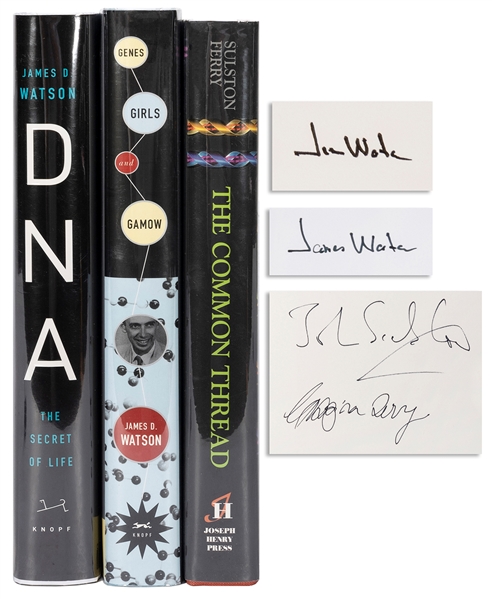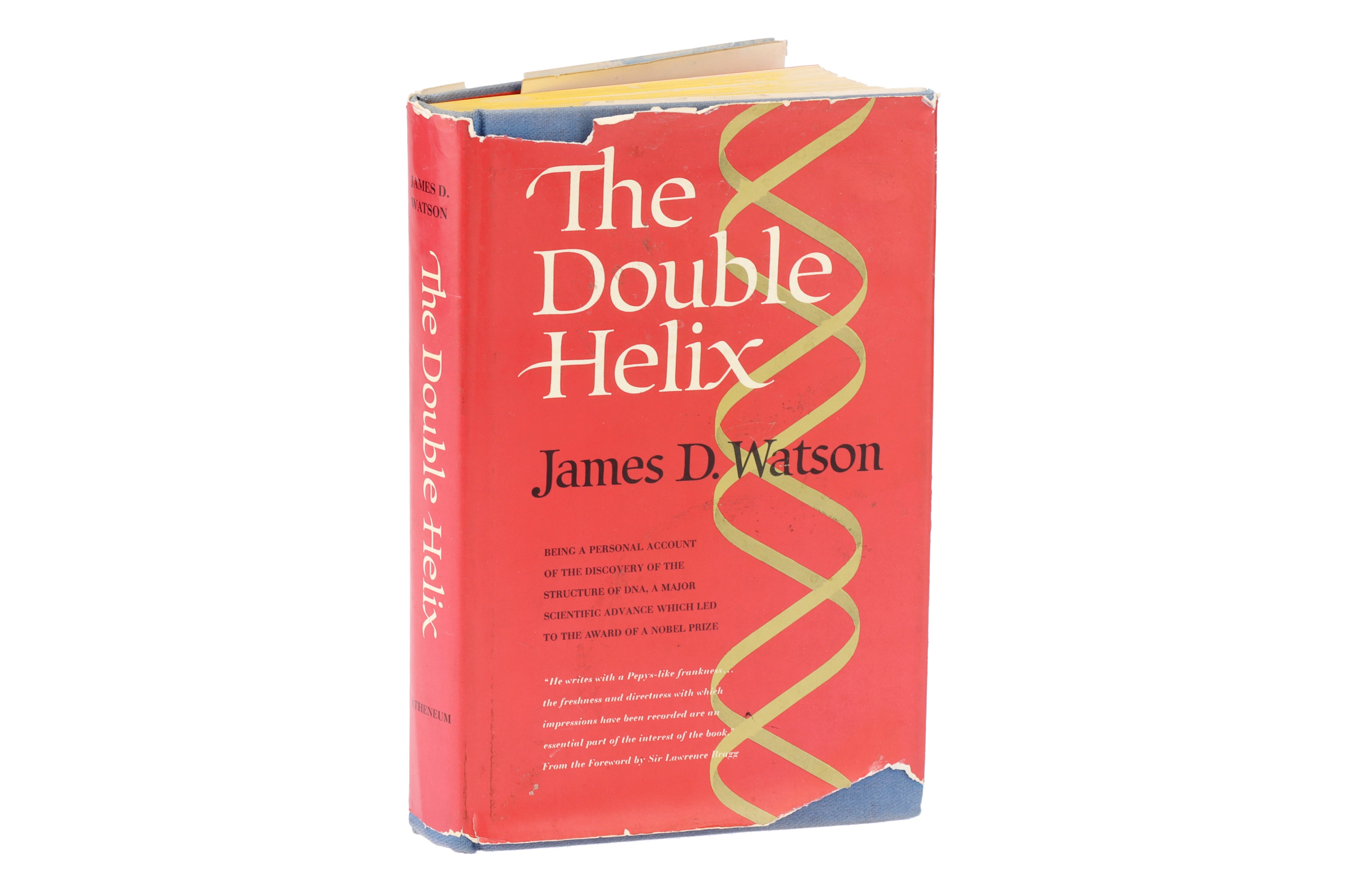WATSON, James D. The Nobel Prize “Banquet” Speech . Manuscript draft notes for the Nobel Prize Acceptance Speech. 5 pages on four leaves, small 8vo (170 x 135 mm), in blue ink on Grand Hotel Stockholm stationery. Stockholm, December 9,1962.
WATSON, James D. The Nobel Prize “Banquet” Speech . Manuscript draft notes for the Nobel Prize Acceptance Speech. 5 pages on four leaves, small 8vo (170 x 135 mm), in blue ink on Grand Hotel Stockholm stationery. Stockholm, December 9,1962. “As soon as dessert was finished, John Steinbeck went to the grand podium overlooking the hall to deliver his Nobel address. In it he emphasized man’s capacity for greatness of heart and spirit in the endless war against weakness and despair. The Cold War and the existence of nuclear weapons silently lurked behind his message of the writer confronting the human dilemma. He saw humans taking over divine prerogatives: ‘Having taken god-like powers, we must seek in ourselves for the responsibility and the wisdom we once prayed some deity might have.’ Ending his oration, he paraphrased St. John the Evangelist: ‘In the end is the Word, and the Word is man, and the Word is with men.’ I became increasingly nervous and could not listen attentively, since in just a few minutes I was to be up on the podium to offer the response of the laureates in physiology or medicine. I hoped my extemporizing would rise above platitudes. Only after I was back at my seat did I relax, knowing that I had spoken from the heart. I was pleased at my last sentences, in which I had aimed for the cadence of one of JFK’s better speeches. Graciously Francis then passed across the table his place card with a note on the back: ‘Much better than I could have done. - F’ [included in this lot]. I could enjoy John Kendrew expressing his joy at being part of a group of five men who had worked and talked together for the past fifteen years and could now come together to Stockholm on the same happy occasion. Then the party moved to the floor below for dancing, most of it done by the white ties and gowns of the Karolinska medical students.” —James D. Watson, The Annotated and Illustrated Double Helix , edited by Alexander Gann and Jan Witkowski, Cold Spring Harbor, 2012, pp. 252-54. [ With: ] Three typed transcripts from the audio recording of the Speech, each with Watson’s holograph annotations, which were incorporated into the final published version; and one clean carbon of the Speech. Each 1 ½ pp . [ And: ] Original typed place card of Francis Crick from the Stockholm Dinner (35 x 109 mm), INSCRIBED BY FRANCIS CRICK on verso upon hearing (and presented to Watson immediately after the Speech) “much better than I could have done / F.” This archive comprises Watson’s original manuscript notes in ink on Grand Hotel Stockholm stationery, written after he had arrived in Stockholm to receive the Nobel Prize in December 1962. The corrected typed transcripts were made following the lecture from the audio recording of Watson’s Speech as it was extemporaneously delivered when he accepted the honor on behalf of his colleagues (see N. Comfort’s introductory essay, pp. 14-15 in this catalogue). As James Watson’s papers are in the Archives at Cold Spring Harbor Laboratory ANY IMPORTANT MANUSCRIPT MATERIAL BY THE CO-DISCOVERER OF THE STRUCTURE OF DNA IS EXCEEDINGLY SCARCE IN THE MARKET .
WATSON, James D. The Nobel Prize “Banquet” Speech . Manuscript draft notes for the Nobel Prize Acceptance Speech. 5 pages on four leaves, small 8vo (170 x 135 mm), in blue ink on Grand Hotel Stockholm stationery. Stockholm, December 9,1962.
WATSON, James D. The Nobel Prize “Banquet” Speech . Manuscript draft notes for the Nobel Prize Acceptance Speech. 5 pages on four leaves, small 8vo (170 x 135 mm), in blue ink on Grand Hotel Stockholm stationery. Stockholm, December 9,1962. “As soon as dessert was finished, John Steinbeck went to the grand podium overlooking the hall to deliver his Nobel address. In it he emphasized man’s capacity for greatness of heart and spirit in the endless war against weakness and despair. The Cold War and the existence of nuclear weapons silently lurked behind his message of the writer confronting the human dilemma. He saw humans taking over divine prerogatives: ‘Having taken god-like powers, we must seek in ourselves for the responsibility and the wisdom we once prayed some deity might have.’ Ending his oration, he paraphrased St. John the Evangelist: ‘In the end is the Word, and the Word is man, and the Word is with men.’ I became increasingly nervous and could not listen attentively, since in just a few minutes I was to be up on the podium to offer the response of the laureates in physiology or medicine. I hoped my extemporizing would rise above platitudes. Only after I was back at my seat did I relax, knowing that I had spoken from the heart. I was pleased at my last sentences, in which I had aimed for the cadence of one of JFK’s better speeches. Graciously Francis then passed across the table his place card with a note on the back: ‘Much better than I could have done. - F’ [included in this lot]. I could enjoy John Kendrew expressing his joy at being part of a group of five men who had worked and talked together for the past fifteen years and could now come together to Stockholm on the same happy occasion. Then the party moved to the floor below for dancing, most of it done by the white ties and gowns of the Karolinska medical students.” —James D. Watson, The Annotated and Illustrated Double Helix , edited by Alexander Gann and Jan Witkowski, Cold Spring Harbor, 2012, pp. 252-54. [ With: ] Three typed transcripts from the audio recording of the Speech, each with Watson’s holograph annotations, which were incorporated into the final published version; and one clean carbon of the Speech. Each 1 ½ pp . [ And: ] Original typed place card of Francis Crick from the Stockholm Dinner (35 x 109 mm), INSCRIBED BY FRANCIS CRICK on verso upon hearing (and presented to Watson immediately after the Speech) “much better than I could have done / F.” This archive comprises Watson’s original manuscript notes in ink on Grand Hotel Stockholm stationery, written after he had arrived in Stockholm to receive the Nobel Prize in December 1962. The corrected typed transcripts were made following the lecture from the audio recording of Watson’s Speech as it was extemporaneously delivered when he accepted the honor on behalf of his colleagues (see N. Comfort’s introductory essay, pp. 14-15 in this catalogue). As James Watson’s papers are in the Archives at Cold Spring Harbor Laboratory ANY IMPORTANT MANUSCRIPT MATERIAL BY THE CO-DISCOVERER OF THE STRUCTURE OF DNA IS EXCEEDINGLY SCARCE IN THE MARKET .
.jpg)





.jpg)


.jpg)
.jpg)

.jpg)


Try LotSearch and its premium features for 7 days - without any costs!
Be notified automatically about new items in upcoming auctions.
Create an alert